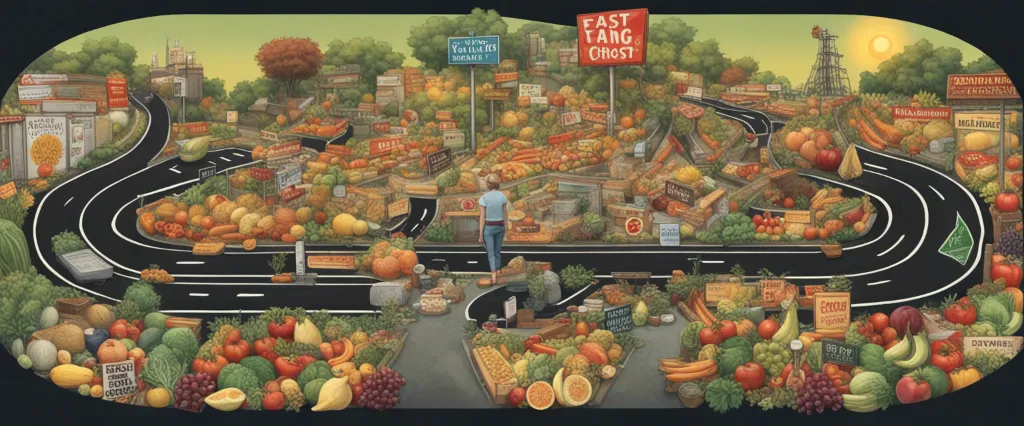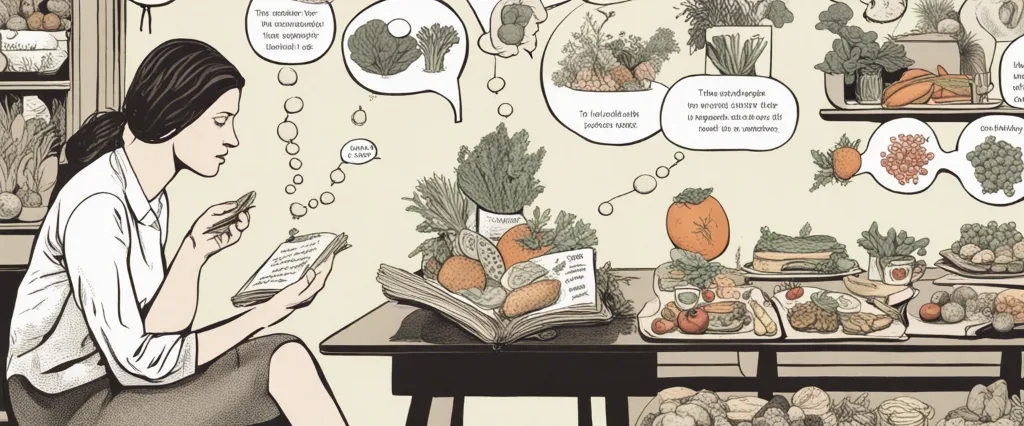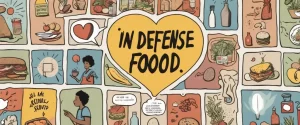
In a world driven by an overwhelming array of choices, food holds an eminent position. Every meal we consume, every cake we savor, reflects a complex web of considerations and consequences. The books, “The Omnivore’s Dilemma” by Michael Pollan and “All Cakes Considered” by Melissa Gray, delve into the intricate relationship between humans and their food, exploring the decisions we make and the impacts these decisions have on our lives and the environment. While one book navigates the depths of our modern food system, critiquing our industrialized approach, the other takes a sweeter approach, guiding us through a delightful world of homemade cakes and the stories that accompany them. This comparative study will explore the thematic similarities and differences between these two literary works and shed light on the myriad choices we face as conscious eaters.
The Omnivore’s Dilemma” serves as a comprehensive critique of industrialized agriculture, examining the multifaceted consequences of our food choices. Michael Pollan exposes the complexities that underlie our seemingly simple decisions, dissecting the repercussions of consuming industrially produced food. By scrutinizing the four different food chains that dominate our supermarkets – industrial, organic, local, and foraging – Pollan challenges readers to question the origins and impacts of the foods we consume. Through this investigation, he aims to unravel the dilemmas faced by omnivores in an era of abundance, where decisions about what to eat have far-reaching implications for our health, the environment, and even our ethical beliefs.
On the other hand, Melissa Gray’s “All Cakes Considered” takes a delightful departure from the weighty subject matter of “The Omnivore’s Dilemma” and delves into the realm of homemade cakes. Gray invites readers into her kitchen, sharing cherished family recipes, personal anecdotes, and the joy of creating delectable cakes from scratch. Her exploration of the art of baking celebrates the warmth and nostalgia that accompanies a homemade cake, turning ordinary confections into expressions of love and connection. Through her stories and recipes, Gray reminds us of the small, but meaningful choices we make in our culinary endeavors, asserting that even a seemingly inconsequential decision, such as choosing butter over margarine, holds significance in the grand tapestry of our lives.
While seemingly disparate, these two works share an overarching theme: the impact of choices. Both authors reveal the interconnectedness of our decisions, demonstrating that what we choose to eat extends beyond basic nourishment. Our choices shape our health, our environment, our communities, and ultimately, our identities. Whether it is the meticulous exploration of industrial food production or the intimate creation of a celebratory cake, both books serve as a reminder that the choices we make are not isolated, but rather, ripple through our lives and the world around us.
As we delve into the depths of “The Omnivore’s Dilemma” and explore the whimsical world of “All Cakes Considered,” we will unravel the intricate web of choices that govern our relationship with food. This comparative study seeks to illuminate the common threads woven between these seemingly distinct literary works, shedding light on the dilemmas we face as consumers, exploring the consequences of our actions, and ultimately questioning the role of food in shaping our lives and the world we inhabit.
Brief Summary of Two Books
The Omnivore’s Dilemma by Michael Pollan
“The Omnivore’s Dilemma” by Michael Pollan explores the complex and interconnected relationship between humans and food. The book examines the various ways food is produced and consumed in modern society, discussing industrial agriculture, the organic food movement, and alternative methods of food production.
Pollan divides the book into three major sections, each focusing on a different type of meal. In the first section, he investigates the industrial food chain by tracing a meal back to its origins. He explores the impact of corn on the American food system and uncovers the hidden processes behind the production of processed foods.
The second section takes a deep dive into alternative food production methods, including organic farming and the hunting and gathering of wild foods. Pollan personally participates in various food production activities, such as hunting for a wild boar and foraging for mushrooms, to understand the traditional ways humans have obtained their food.
In the final section, Pollan explores the ethics behind food choices and the consequences of our decisions on the environment, animal welfare, and our own health. He examines the system of industrial organic farming and questions whether it truly provides a sustainable and ethical alternative to conventional agriculture.
Throughout the book, Pollan raises important questions about the ecological impact, health implications, and ethical considerations of our food choices. He challenges readers to consider where their food comes from, how it is produced, and the effects it has on the world around them. Ultimately, “The Omnivore’s Dilemma” encourages readers to be more mindful and informed about the food they eat.
All Cakes Considered by Melissa Gray
All Cakes Considered by Melissa Gray is a delightful and delectable book that takes readers on a journey through the world of cakes. The author, a public radio producer and avid baker, shares over 50 tested and easily accessible cake recipes, each with its own unique story and personal anecdotes.
The book begins with an introduction to Gray’s love for baking and her belief that cake is a universal language that brings people joy. She then presents a wide range of cake recipes, from classic favorites like chocolate and carrot cake to more exotic creations such as pistachio cardamom and coconut lime.
What makes this book truly special is the author’s personal touch. With each recipe, Gray shares the story behind it and how it came to be a part of her life. She reminiscences about family gatherings, neighborly exchanges, and even baking disasters, making the reader feel like they are sitting around a kitchen table, sharing stories and enjoying a slice of cake.
In addition to the recipes, the book is filled with helpful tips and techniques to ensure successful baking. Gray provides step-by-step instructions and highlights common mistakes to avoid, making it easy for even novice bakers to confidently whip up a delicious cake.
All Cakes Considered is not only a recipe book but also a celebration of the joy and comfort that baking can bring. It is a heartfelt and charming collection that will inspire readers to grab their aprons, preheat their ovens, and indulge in the art of cake-making.
Comparison between Two Books

Similarities in Food Culture
The Omnivore’s Dilemma by Michael Pollan and All Cakes Considered by Melissa Gray, albeit exploring different aspects of food culture, share some remarkable similarities.
1. Appreciation for traditional food: Both books emphasize the importance of traditional food and cooking techniques. Pollan investigates the roots of Western food culture, delving into the origins of commonly consumed food items, while Gray explores the world of baking through classic cake recipes passed down through generations. Both authors value and promote the preservation of traditional food practices.
2. Sustainable and ethical food production: Both authors advocate for sustainable and ethical food production practices. Pollan raises concerns about industrial farming, highlighting the negative impacts on the environment and the health implications of processed foods. Gray, on the other hand, focuses on using locally sourced and seasonal ingredients in her cake recipes, endorsing the idea of supporting local farmers and reducing the carbon footprint associated with long-distance food transportation.
3. DIY approach: Both books encourage readers to take a DIY approach to food. Pollan investigates various food production methods, including hunting and foraging, to emphasize the value of knowing where our food comes from. Similarly, Gray emphasizes the joy and satisfaction of baking from scratch, inspiring readers to create their own delectable cakes rather than relying on store-bought options.
4. Cultural significance of food: Both authors emphasize the cultural significance of food in our lives. Pollan explores the impact of different cultural traditions on food choices and eating habits, highlighting how food provides a sense of identity and belonging. Meanwhile, Gray shares personal anecdotes and stories related to the cakes she features, underscoring how certain foods can evoke nostalgia and hold special meaning in our lives.
5. Importance of mindful eating: Both books promote the idea of mindful eating. Pollan encourages readers to question their dietary choices and be conscious of the impact those choices have on their health and the environment. Gray, while focusing on cakes, reminds readers to savor each bite and appreciate the experience of enjoying homemade treats. Both authors highlight the need for a more thoughtful and intentional approach to our food consumption.
In summary, The Omnivore’s Dilemma and All Cakes Considered may differ in their specific focus within food culture, but they share common themes such as the appreciation for traditional food, sustainable and ethical production, DIY approach, cultural significance, and the importance of mindful eating. These similarities demonstrate the authors’ commitment to promoting a more conscious and meaningful food culture.
Divergences in Food Culture
The Omnivore’s Dilemma by Michael Pollan and All Cakes Considered by Melissa Gray are two books that explore the theme of food but from different perspectives. While Pollan’s book delves into the complexities of our modern food system, Gray focuses on the joy of baking and sharing cakes. As a result, the books diverge significantly in their portrayal of food culture.
In The Omnivore’s Dilemma, Pollan investigates the origins of our food, examining the complex web of industrial agriculture, organic farming, and alternative food movements. He highlights the impacts of mass production, factory farming, and the use of synthetic chemicals on our health, the environment, and animal welfare. Pollan delves into the interconnectedness of our food choices and the wider implications they have on society. His exploration of the industrial food chain and its consequences exposes the negative aspects of food culture, shedding light on the hidden realities behind the food we consume.
On the other hand, All Cakes Considered focuses on the lighter side of food culture. Gray’s book celebrates the joy of baking and the sense of community that comes with sharing homemade cakes. Instead of examining the broader food system, Gray shares personal anecdotes and recipes, highlighting the pleasure and nostalgia associated with baking and indulging in sweet treats. Her book embraces the cultural tradition of sharing homemade cakes for celebrations, showcasing the positive aspects of food culture, such as the creativity and happiness it can bring.
While The Omnivore’s Dilemma offers a critical analysis of food culture, exploring its complexities and raising awareness of its problems, All Cakes Considered celebrates the cultural and social aspects of food, focusing on the joy and togetherness it can inspire. These divergent approaches ultimately provide a well-rounded understanding of food culture – one that prompts readers to question the system while also recognizing the emotional and communal significance of food.

Conclusion
The worthiness of reading a book depends on personal preferences and interests. “The Omnivore’s Dilemma” by Michael Pollan is a highly acclaimed and thought-provoking book that explores the complex relationship between humans and food. It delves into the ethical, environmental, and health aspects of our food choices, making it an excellent choice for readers interested in the topics of sustainability, agriculture, and food systems.
On the other hand, “All Cakes Considered” by Melissa Gray is a cookbook that focuses on baking cakes. It includes numerous recipes, tips, and anecdotes, making it an enjoyable read for baking enthusiasts, home bakers, or anyone looking to expand their repertoire of cake recipes.
Ultimately, the more worthy book to read depends on your personal interests. If you are fascinated by food politics and enjoy exploring the larger implications of our food choices, “The Omnivore’s Dilemma” would be the more deserving choice. However, if you have a passion for baking and want to discover new cake recipes, “All Cakes Considered” would be the more worthwhile read.

